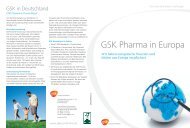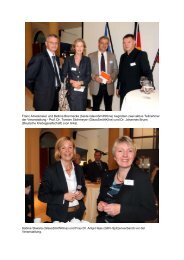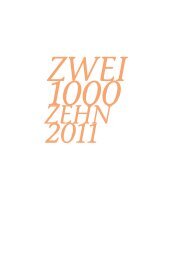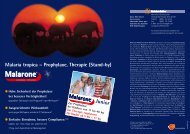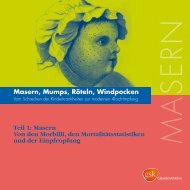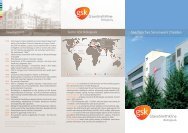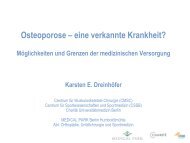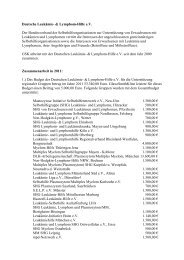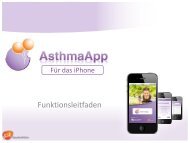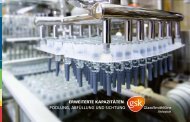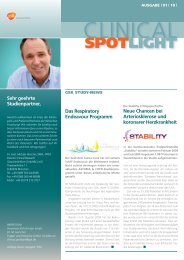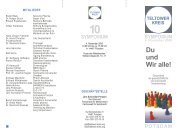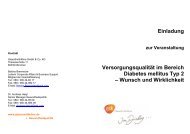Audits und Inspektionen - Tipps und Infos Teil II - GlaxoSmithKline
Audits und Inspektionen - Tipps und Infos Teil II - GlaxoSmithKline
Audits und Inspektionen - Tipps und Infos Teil II - GlaxoSmithKline
Sie wollen auch ein ePaper? Erhöhen Sie die Reichweite Ihrer Titel.
YUMPU macht aus Druck-PDFs automatisch weboptimierte ePaper, die Google liebt.
Sehr geehrte<br />
Studienpartner,<br />
"Herzlich willkommen im Kreis der Metropolis<br />
<strong>und</strong> Preferred Partners der Klinischen<br />
Forschung! Wir möchten Sie künftig noch<br />
besser über unsere geplanten Studien informieren,<br />
so dass Sie besser planen <strong>und</strong> mit<br />
uns kommunizieren können. Das ist ein weiterer<br />
Schritt zu einer ehrlichen Partnerschaft<br />
zum Wohl der Patienten. Wir hoffen auf Ihr<br />
Feedback <strong>und</strong> Ihre Anregungen!"<br />
Dr. med. Michael Herschel, MBa, FFPM<br />
Director Clinical Research<br />
<strong>GlaxoSmithKline</strong> GmbH&Co.KG<br />
Theresienhöhe 11<br />
D-80339 München<br />
Tel.: +49 (0)89 360 44 8588<br />
Fax: +49 (0)89 360 44 98588<br />
Mobil: +49 (0)174 210 3727<br />
iMPRESSUM<br />
Verantwortlich für den Inhalt:<br />
Dr. M. Herschel<br />
Fragen <strong>und</strong> Wünsche richten Sie bitte an:<br />
clinical.spotlight@gsk.com<br />
AUSGABE | 02 | 10 |<br />
CliniCal<br />
SpotLight<br />
gSK Study-NewS<br />
Was wissen wir<br />
über Sie?<br />
Sie haben sich sicher schon gefragt, was die<br />
Kriterien für die Zentrenauswahl für eine neue<br />
Studie sind. Dies sind zum einen natürlich die<br />
antworten, die Sie uns auf die studienspezifische<br />
Machbarkeitsanalyse geben. Einen nicht<br />
unerheblichen anteil machen jedoch auch ihre<br />
Erfolge in vorangegangenen Studien aus. Um<br />
einen Überblick darüber zu erhalten, verwenden<br />
wir eine anwendung mit dem namen Sitenet.<br />
Mit Hilfe von Sitenet können wir in Form<br />
eines einfachen ampelsystems die leistungen<br />
der einzelnen Zentren in den abgeschlossenen<br />
Projekten darstellen. in die Darstellung gehen<br />
Parameter wie Geschwindigkeit (z.B. Einschluss<br />
von Patienten pro Monat), Zuverlässigkeit (z.B.<br />
zugesagte vs. tatsächlich Patienten) <strong>und</strong> natürlich<br />
die Qualität (z.B. benötigte Zeit zur Beantwortung<br />
der Queries) ein. Sie können somit<br />
durch gewissenhafte <strong>und</strong> zuverlässige arbeit<br />
zum einen ihrer laufenden Studie zum Erfolg<br />
verhelfen. Darüber hinaus schaffen Sie die Basis<br />
für eine langfristige Zusammenarbeit, indem<br />
Sie sich in diesem ampelsystem von anderen<br />
Zentren abheben.<br />
Bedenken Sie dies bitte bei der abgabe einer<br />
Feasibility <strong>und</strong> nehmen Sie sich für die Beantwortung<br />
der Fragen ausreichend Zeit. Sie<br />
erleichtern uns damit die Studienplanung <strong>und</strong><br />
verbessern durch eine realistische Einschätzung<br />
ihr Bild im ampelsystem.<br />
Was macht die GIFO<br />
bei unseren Studien?<br />
Für Patienten, die an klinischen Studien teilnehmen,<br />
steht Sicherheit an oberster Stelle. Dazu gehört,<br />
dass ein kompetenter ansprechpartner r<strong>und</strong><br />
um die Uhr zur Verfügung steht. Dies ist wichtig,<br />
falls ein Patient wegen eines notfalls behandelt<br />
wird, <strong>und</strong> der behandelnde arzt für die medizinische<br />
Betreuung informationen über die Prüfsubstanz<br />
benötigt (Stichwort Entblindung). Sie<br />
sind natürlich für diese Fälle der Hauptansprechpartner.<br />
Da Sie aber hierfür nicht 24 St<strong>und</strong>en am<br />
Tag, 7 Tage die Woche zur Verfügung stehen können,<br />
unterstützt Sie bei dieser wichtigen aufgabe<br />
das Giftinformationszentrum der Universitätsmedizin<br />
der Johannes Gutenberg-Universität Mainz<br />
(auch GiFO genannt).<br />
Die Mitarbeiter der GiFO sind geschult, um<br />
studienspezifische auskunft bezüglich der Prüfsubstanz<br />
zu geben, <strong>und</strong> können in notfallsituationen<br />
auch Patienten über das Randomisierungssystem<br />
entblinden. Dies geschieht im Optimalfall<br />
nach Rücksprache mit ihnen, kann aber auch von<br />
den Mitarbeitern der GiFO selbständig durchgeführt<br />
werden. Sie werden danach darüber informiert.<br />
Damit eine eindeutige identifizierung des<br />
Patienten möglich ist, ist es wichtig, dass der Patientenausweis<br />
von ihnen vollständig ausgefüllt<br />
ist <strong>und</strong> vom Patienten ständig mitgeführt wird.<br />
Durch die Zusammenarbeit mit ihnen <strong>und</strong> der<br />
GiFO können wir eine optimale Sicherheit für unsere<br />
Studienteilnehmer gewährleisten.
quaLitätSmaNagemeNt<br />
<strong>Audits</strong> <strong>und</strong> <strong>Inspektionen</strong> - <strong>Tipps</strong> <strong>und</strong> <strong>Infos</strong><br />
<strong>Teil</strong> <strong>II</strong> - Wie läuft ein Audit/eine Behördeninspektion ab?<br />
Bei einem audit / einer Behördeninspektion werden<br />
vom auditor / inspektor die Prüfarztordner<br />
<strong>und</strong> die Patientenordner durchgesehen. Der<br />
auditor bzw. inspektor darf sich gr<strong>und</strong>sätzlich<br />
zwecks SDV (Source Data Verification) alle Daten<br />
einschließlich der Patientenakten (auch PC-<br />
Daten) der Studienpatienten der Klinischen Studie<br />
anschauen. Wie beim Monitoring darf er<br />
jedoch keine CRFs / Krankenakten als Original<br />
oder Kopie mitnehmen. Er darf sich aber Einzelheiten<br />
für seinen Bericht notieren. als Prüfarzt<br />
sind Sie dazu verpflichtet, während des audits<br />
oder der Behördeninspektion anwesend zu<br />
sein <strong>und</strong> mitzuwirken. So müssen Sie bzw. ihre<br />
an der Studie involvierten Mitarbeiter z. B. bei<br />
der Bereitstellung der Studienunterlagen / Krankenakten<br />
behilflich sein.<br />
Bei einem audit wird nach Durchsicht der Stu-<br />
CliniCal<br />
AUSGABE | 02 | 10 |<br />
SpotLight<br />
Sicherlich haben Sie von Kollegen oder Ihrem Studienmonitor schon von <strong>Audits</strong> oder Behördeninspektionen gehört oder vielleicht<br />
hatten Sie selbst ein Audit oder eine Inspektion an Ihrem Zentrum? Ein Audit oder eine Inspektion sind bei protokollgemäßer Studiendurchführung<br />
sicherlich kein Gr<strong>und</strong> zur Panik.<br />
NewSticKer<br />
Zentraler Helpdesk überarbeitet<br />
dienunterlagen ein interview mit dem Prüfarzt<br />
<strong>und</strong> weiteren an der Studie beteiligten Mitarbeitern<br />
(z. B. Study nurse) geführt. Das interview<br />
erstreckt sich dabei meist neben Detailfragen<br />
zu den eingeschlossenen Patienten/CRF auch<br />
auf Fragen zur aufklärung <strong>und</strong> Rekrutierung<br />
von Studienpatienten, auf die allgemeine Studiendurchführung<br />
(z. B. ablauf der Visiten, körperliche<br />
Untersuchung, Tests). Meist wird die<br />
Study nurse bezüglich der aufbewahrung der<br />
Studienmedikation, der Führung der Temperaturlogs,<br />
der abnahme der laborproben, der Erhebung<br />
der Vitalparameter, der Durchführung<br />
von EKGs oder anderer Testverfahren befragt.<br />
Es kann auch sein, dass einzelne Mitarbeiter des<br />
Zentrums einzeln <strong>und</strong> separat interviewt werden.<br />
Dem auditor stehen – im Gegensatz zu<br />
einer Behördeninspektion - die internen Mo-<br />
Sie haben Ihr Inform-Password vergessen ….<br />
Ihr Inform Zugang ist gesperrt …….<br />
Sie haben in Ramos falsche Daten erfasst …..<br />
Ein Ramos-Fax ist bei Ihnen nicht angekommen …<br />
Dann hilft nur eines – ein Anruf beim „GSK-Clinical Support Helpdesk“<br />
immer wieder erreichen uns anrufe von Prüfzentren,<br />
welche uns um Hilfe bei diesen oft sehr<br />
dringenden Fragen bitten. aber, auf „das Herz“<br />
dieser Systeme haben wir keinen Zugriff! Dies<br />
bedeutet, dass wir diese Fragen für Sie nicht lösen<br />
können, die Hilfe muss von anderer Stelle<br />
kommen, dem „GSK-Clinical Support Helpdesk“.<br />
GSK bietet seit mehr als einem Jahr den Service<br />
dieses zentralen Helpdesks an. Er soll Sie bei allen<br />
Fragen r<strong>und</strong> um die iT-Studiensysteme unterstützen<br />
<strong>und</strong> ist somit die zentrale anlaufstelle<br />
für Sie. Kontaktieren Sie den zentralen Helpdesk<br />
wenn Sie Schwierigkeiten mit RaMOS, inForm<br />
oder mylesson haben. Über eine gebührenfreie<br />
Rufnummer führt Sie ein einfaches Telefonmenü<br />
zu den entsprechenden Helpdeskmitarbeiten.<br />
Diese Mitarbeiter sind Experten <strong>und</strong> können ihnen<br />
schnell, unkompliziert <strong>und</strong> kompetent weiterhelfen.<br />
Selbst wenn Sie Probleme mit anderen<br />
(GSK-Fremden) iT-Systemen haben, können Sie<br />
diese Fragen über ein Extra-Menü an den Helpdesk<br />
adressieren.<br />
Der zentrale Helpdesk bietet einen 24h-Service<br />
an 7 Tagen in der Woche an. in der Kernarbeitszeit<br />
(Montag – Freitag, 09.00 – 17.00 Uhr) steht er ihnen<br />
auch deutschsprachig zur Verfügung.<br />
nitoringberichte des Monitors zur Verfügung.<br />
Bei einem audit werden nur Ordner/Studiendokumente<br />
einer vorab definierten Studie eines<br />
Sponsors durchgesehen werden.<br />
abweichend von einem audit werden bei einer<br />
Behördeninspektion häufig auch die allgemeinen<br />
Räumlichkeiten der Praxis inspiziert <strong>und</strong><br />
dabei ein allgemeiner Fragenkatalog der jeweiligen<br />
Behörde abgearbeitet. Meist, aber nicht<br />
immer sind die gestellten Fragen weniger protokollspezifisch.<br />
Mittlerweile wird teilweise auch<br />
von inspektoren SDV (Source Data Verification)<br />
durchgeführt. Dem inspektor stehen die internen<br />
Monitoringberichte des Monitors nicht zur<br />
Verfügung. Bei einer inspektion können auch<br />
Ordner/Studiendokumente unterschiedlicher<br />
Studien unterschiedlicher Sponsoren durchgesehen<br />
werden.<br />
Folgende angaben sollten Sie bereithalten,<br />
wenn Sie den Helpdesk kontaktieren:<br />
ß ihren namen<br />
ß ihre e-Mail-adresse<br />
ß Die Protokoll- oder Studiennummer (z.B.<br />
aBC 123456)<br />
ß ihre Zentrumsnummer<br />
ß Ggf. die Patientennummer<br />
nutzen Sie diesen Service <strong>und</strong> kontaktieren Sie<br />
die gebührenfreie Telefonnummer:<br />
0800-182 0486 Rufen Sie an!
aKtueLLe StudieN<br />
CliniCal<br />
AUSGABE | 02 | 10 |<br />
SpotLight<br />
INDIKATION STUDIENNR. STUDIENTITEL ANSPRECHPARTNER<br />
alzheimer lPZ114458 Effect of SB659032 on CSF Biomarkers and MRi imke.i.reipen@gsk.com<br />
asthma B2C112060 a randomized, double-blind, double-dummy, parallel-group, placebo controlled<br />
(on inhaled corticosteroid medication), multicenter study to evaluate<br />
the efficacy and safety of vilanterol inhalation powder (GW642444)<br />
and salmeterol, compared with placebo in the treatment of persistent<br />
asthma in adults and adolescents uncontrolled on inhaled corticosteroids<br />
asthma HZa106827 a randomised, double-blind, placebo-controlled (with rescue medication),<br />
parallel group multicentre study of Fluticasone Furoate/GW642444 inhalation<br />
Powder and Fluticasone Furoate inhalation Powder alone in the treatment<br />
of persistent asthma in adults and adolescents .<br />
asthma MEa114092 a multicentre, randomised, double-blind, parallel group study to evaluate<br />
absolute bioavailability and the PK/PD response of mepolizumab via the<br />
SC route in mild to moderate asthmatic patients<br />
COPD DB2113360 GSK573719/GW642444 a Randomized, Double-Blind, Parallel-Group Trial<br />
Evaluating the Safety and Efficacy of GSK573719/GW642444 and Tiotropium<br />
over 6 Months in Subjects with COPD<br />
COPD DB2113361 GSK573719/GW642444 a Randomized, Double-Blind, Placebo-Controlled,<br />
Parallel-Group Trial Evaluating the Safety and Efficacy of GSK573719<br />
and GW642444 individually and in Combination over 6 Months in Subjects<br />
with COPD<br />
COPD DB2113374 GSK573719/GW642444 a Randomized, Double-Blind, Parallel-Group Trial<br />
Evaluating the Safety and Efficacy of GSK573719/GW642444 and Tiotropium<br />
over 6 Months in Subjects with COPD<br />
COPD HZC113107 a 12-Week Placebo Controlled Study to Evaluate the 24 Hour Pulmonary<br />
Function of Fluticasone Furoate (FF)/Vilanterol (Vi) inhalation Powder (FF/Vi<br />
inhalation Powder) Once Daily Compared with Salmeterol/Fluticasone Propionate<br />
(FP) inhalation Powder Twice Daily in Subjects with Chronic Obstructive<br />
Pulmonary Disease (COPD)<br />
COPD MaB115032 a 4-week Dose-Ranging, Dose-interval, Efficacy, Safety and Tolerability<br />
Study of GSK961081 in Subjects with COPD<br />
COPD MKi113006 a Randomised, Double-Blind, Placebo-Controlled, Parallel-Group, Multicentre,<br />
Dose Ranging Study to Evaluate the Efficacy and Safety of losmapimod<br />
(GW856553) Tablets administered Twice Daily compared with Placebo<br />
for 24 Weeks in adult Subjects with Chronic Obstructive Pulmonary<br />
Disease<br />
Diabetes (Typ1) OTX113390 Evaluation of the safety and tolerability of re-dosing with otelixizumab in<br />
type 1 diabetic subjects<br />
Muskeldystrophie DMD114044 a randomized, double-blind, placebo-controlled clinical study to assess<br />
the efficacy and safety of GSK2402968 in ambulant subjects with Duchenne<br />
muscular dystrophy<br />
Hepatitis B 112688 an open, phase iV, multicentre study to assess the long-term persistence<br />
of antibodies against hepatitis B and the immune response to a hepatitis<br />
B (Engerix-B Kinder) vaccine challenge in children at 7-8 years of age, previously<br />
primed and boosted in the first two years of life with GlaxoSmith-<br />
Kline (GSK) Biologicals’ DTPa-HBV-iPV/Hib (infanrix hexa) vaccine<br />
Herpes Zoster 110390 a phase iii, randomized, observer-blind, placebo-controlled, multicentre,<br />
clinical vaccination trial to assess the prophylactic efficacy, safety, and immunogenicity<br />
of GSK Biologicals’ gE/aS01B vaccine when administered<br />
intramuscularly on a 0, 2-month schedule in adults aged 50 years and<br />
older.<br />
Herpes Zoster 112673 a phase i/iia randomized, observer-blind, placebo-controlled, multicenter<br />
study to evaluate the safety and immunogenicity of the GSK Biologicals’<br />
herpes zoster vaccine, gE/aS01B in comparison to placebo when administered<br />
as 3 doses to adult HiV-infected subjects.<br />
Herpes Zoster 113077 a phase iii, randomized, observer-blind, placebo-controlled, multicentre,<br />
clinical vaccination trial to assess the prophylactic efficacy, safety and immunogenicity<br />
of GSK Biologicals’ gE/aS01B vaccine when administered<br />
intramuscularly on a 0, 2-month schedule in adults aged 70 years and<br />
older.<br />
Herpes Zoster 113206 a prospective, observational, multicentre, community physician based surveillance<br />
to estimate the incidence, complications, and economic burden<br />
and impact on quality of life of herpes zoster in adults >= 50 years of age<br />
in Germany.<br />
britta.b.sassa@gsk.com<br />
britta.b.sassa@gsk.com<br />
klaus.k.ams@gsk.com<br />
klaus.k.ams@gsk.com<br />
britta.b.sassa@gsk.com<br />
klaus.k.ams@gsk.com<br />
klaus.k.ams@gsk.com<br />
klaus.k.ams@gsk.com<br />
lieselotte.l.buschmann@gsk.com<br />
katharina.k.fuchs@gsk.com<br />
heinz.h.richter@gsk.com<br />
christina.c.eisenhofer-wolff@gsk.com<br />
christine.c.peter@gsk.com<br />
alexandra.a.fritsch@gsk.com<br />
christine.c.peter@gsk.com<br />
claudia.c.puettner@gsk.com
aKtueLLe StudieN<br />
CliniCal<br />
AUSGABE | 02 | 10 |<br />
SpotLight<br />
INDIKATION STUDIENNR. STUDIENTITEL ANSPRECHPARTNER<br />
Herpes Zoster 114825 an open, phase ii long term extension study to evaluate the safety of and<br />
immune responses to GSK Biologicals’ candidate herpes zoster vaccine,<br />
(gE/aS01B) 1437173a, at Months 48, 60 and 72 post-vaccination in healthy<br />
subjects aged 60 years of age and older.<br />
HiV 111679 a Phase iib, randomized, observer-blind, placebo controlled, multicenter<br />
primary/booster therapeutic vaccination study to determine efficacy and<br />
safety of F4co/ aS01B vaccine, administered intramuscularly according to<br />
either a two dose (0, 4 weeks) or a three dose (0, 4, 28 weeks) schedule<br />
in aRT-naïve HiV-1 infected persons aged 18-55 years<br />
HiV 113933 Efficacy and safety of HiV vaccine 732461 within the context of treatment<br />
interruption in aRT-experienced fully suppressed HiV infected persons (not<br />
final title)<br />
HiV inG113086 GSK1349572 a Phase iii, randomized, double-blind study to determine<br />
the non-inferiority of once daily GSK1349572 to raltegravir when both<br />
are administered with either abacavir/lamivudine or tenofovir/emtricitabine<br />
in HiV-1 infected, antiretroviral naive adult subjects<br />
HiV inG114467 a Phase iii, randomized, study of the safety and efficacy of GSK1349572<br />
plus abacavir-lamivudine fixed-dose combination therapy administered<br />
once daily compared to standard-of-care over 48 weeks in HiV-1 infected<br />
antiretroviral therapy naive adult subjects.<br />
HiV SGn113404 Phase iib study to select a once daily oral dose of GSK2248761 administered<br />
with tenofovir/emtricitabine or abacavir/lamivudine in HiV-1 infected<br />
antiretroviral therapy naive adult subjects<br />
influenza 113275 a phase iii, double-blind, randomized study to evaluate the immunogenicity<br />
and safety of GSK Biologicals’ quadrivalent influenza vaccine compared<br />
to GSK Biologicals’ trivalent influenza vaccine administered intramuscularly<br />
in children aged 3 to 17 years and to describe the safety and<br />
immunogenicity of GSK Biologicals'quadrivalent influenza vaccine in<br />
children aged 6 to 35 months.<br />
influenza 114269 a phase iii randomized, partially-blind, controlled, multi-country, multicentre<br />
study to evaluate the immunogenicity, reactogenicity and safety<br />
of GSK Biologicals’ quadrivalent influenza vaccine FlU D-QiV<br />
(GSK2321138a) and to evaluate the clinical consistency of three production<br />
lots of FlU D-QiV in terms of immunogenicity, when administered intramuscularly<br />
to adults 18 years of age and older.<br />
influenza 114294 a phase iia, observer-blind, multi-country, multi-centre, randomised study<br />
to evaluate the immunogenicity, safety and reactogenicity of the <strong>GlaxoSmithKline</strong><br />
Biologicals' quadrivalent influenza vaccine (QiV) adjuvented<br />
with various doses of the aS03 (GSK 2584786a), administered in<br />
children aged 6 to 35 months, and compared to non-adjuvanted QiV and<br />
FluarixTM<br />
influenza nai114373 a Phase iii international, randomized, doubleblind, double-dummy study<br />
to evaluate the efficacy and safety of 300 mg or 600 mg of intravenous<br />
zanamivir twice daily compared to 75 mg of oral oseltamivir twice daily in<br />
the treatment of hospitalized adults and adolescents with influenza<br />
leukämie MEK111759 an Open-label, Dose-Escalation, Phase i/ii, Two-Part Study to investigate<br />
the Safety, Pharmacokinetics, Pharmacodynamics, and Clinical activity of<br />
the MEK inhibitor GSK1120212 in Subjects with Relapsed or Refractory<br />
acute Hematological Malignancies<br />
Mammakarzinom 113172 a double blind, randomized, placebo-controlled, Phase i/ii Study evaluating<br />
the safety, immunogenicity and clinical activity of neoadjuvant treatment<br />
with WT1-a10 + aS15 antigen-Specific Cancer immunotherapeutic<br />
in combination with standard therapy in women with WT1-positive Stage<br />
ii or iii breast cancer<br />
Mammakarzinom EGF113333 GW572016 a Randomized, Open-label Study of lapatinib Plus Chemotherapy<br />
versus Trastuzumab Plus Chemotherapy as First-line Treatment<br />
for Women with HER2-positive and p95HER2-positive Metastatic Breast<br />
Cancer<br />
Mammakarzinom EGF114299 a phase iii trial to compare the safety and efficacy of lapatinib plus trastuzumab<br />
plus an aromatase inhibitor (ai) versus trastuzumab plus an ai<br />
versus lapatinib plus an ai as first-line therapy in postmenopausal patients<br />
with hormone sensitive, HER2-positive metastatatic breast cancer (MBC)<br />
who have received trastuzumab and endocrine therapy in the neo-/adjuvant<br />
setting<br />
Melanom BRF113683 GSK2118436 a Phase iii randomized double blind study of GSK2118436<br />
compared to standard of care for metastatic melanoma<br />
christine.c.peter@gsk.com<br />
alexandra.a.fritsch@gsk.com<br />
alexandra.a.fritsch@gsk.com<br />
meike.m.sikora@gsk.com<br />
meike.m.sikora@gsk.com<br />
meike.m.sikora@gsk.com<br />
christina.c.eisenhofer-wolff@gsk.com<br />
gisela.m.tuerk@gskbio.com<br />
franziska.f.feldl@gsk.com<br />
meike.m.winsel@gsk.com<br />
nadia.n.ghaussy@gsk.com<br />
elisabeth.e.aigner@gsk.com<br />
wolfgang.w.kuester@gsk.com<br />
malte.m.oppermann@gsk.com<br />
frank.f.richter@gsk.com
aKtueLLe StudieN<br />
CliniCal<br />
AUSGABE | 02 | 10 |<br />
SpotLight<br />
INDIKATION STUDIENNR. STUDIENTITEL ANSPRECHPARTNER<br />
Melanom BRF113710 a Phase ii single-arm, open-label study of GSK2118436 in previously treated<br />
BRaF mutant metastatic melanoma.<br />
Melanom BRF113929 a Phase ii Open-label, Two-Cohort, Multicentre Study of GSK2118436<br />
as a Single agent in Treatment naive and Previously Treated Subjects with<br />
BRaF Mutation-Positive Metastatic Melanoma Brain Metastases<br />
Melanom MEK114267 a Phase iii open label, randomized trial of GSK1120212 vs DTiC in treatment<br />
naive patients with metastatic melanoma<br />
Meningokokken 113977 a phase iiib, open, multi-centre, controlled study to assess the longterm<br />
persistence of antibodies after a single dose of <strong>GlaxoSmithKline</strong><br />
(GSK) Biologicals’ meningococcal serogroup aCWY tetanus-toxoid conjugate<br />
vaccine (MenaCWY-TT) versus one dose of novartis’ meningococcal<br />
serogroup C CRM197 conjugate vaccine (Menjugate®) administered<br />
in healthy subjects aged 2 through 10 years in study MEnaCWY-TT-081<br />
PRi (111414) and to evaluate the safety and immunogenicity of a booster<br />
dose of MenaCWY-TT administered 68 months post-primary vaccination.<br />
amended 12 august 2010<br />
Morbus Crohn CCX114151 a Randomised, Double-blind, Placebo-Controlled Study of GSK1605786<br />
in the Treatment of Crohn's Disease<br />
Morbus Werlhof TRa112940 a longitudinal bone marrow study in eltrombopag olamine (SB-497115-<br />
GR) treated adults, with chronic idiopathic thrombocytopenic purpura<br />
(iTP).<br />
Multiple Sklerose nGM114840 a randomized, single blind, placebo-controlled, single ascending dose/repeat<br />
dose cohort study to assess safety, tolerability, pharmacokinetics and<br />
immunogenicity of GSK1223249 in patients with relapsing forms of multiple<br />
sclerosis<br />
nierenzellkarzinom VEG113387 a randomized, double-blind, placebo-controlled phase iii study to evaluate<br />
the efficacy and safety of pazopanib as adjuvant therapy for subjects<br />
with localized or locally advanced RCC following nephrectomy<br />
PaH aMB112565 aMBiTiOn: a randomized, double-blind, multicenter study of first-line<br />
combination therapy with aMBrisentan and Tadalafil vs. monotherapy in<br />
subjects with pulmonary arterial hypertensiOn<br />
PaH (pädiatrisch) aMB112529 a randomized, open label study comparing safety and efficacy parameters<br />
for a high and a low dose of ambrisentan (adjusted for body weight)<br />
for the treatment of pulmonary arterial hypertension in paediatric patients<br />
aged 8 up to 18 years<br />
Pankreaskarzinom MEK113487 a Randomized, Double-Blind Placebo-Controlled Phase ii Study of the<br />
MEK inhibitor GSK1120212 plus Gemcitabine vs. Placebo plus Gemcitabine<br />
in Subjects with Metastatic Pancreatic Cancer<br />
Parkinson ROP111662 a fixed dose study to characterize the dose response for REQUiP Xl administered<br />
as monotherapy in patients with early stage Parkinson's disease.<br />
Prostatahyperplasie FDC114615 Comparative efficacy of DuodartTM versus watchful waiting with step-up<br />
therapy to tamsulosin in the management of treatment naïve men with<br />
symptomatic BPH<br />
Solide Tumore MEK112110 a Phase iB/ii Study of the MEK inhibitor GSK1120212 in Combination<br />
with Oral Everolimus in Subjects with Solid Tumors<br />
Tetanus 113060 a phase iV, open, non-randomized, multicentre study to assess the reactogenicity<br />
and immunogenicity of a booster dose of GSK Biologicals’ combined<br />
reduced-antigen-content diphtheria-tetanus, acellular pertussis and<br />
inactivated poliovirus vaccine dTpa-iPV (Boostrix-Polio) when administered<br />
in healthy adult subjects, 10 years after previous booster vaccination with<br />
dTpa-iPV in the study 711866/003 (dTpa-iPV-003).<br />
christoph.c.geiger@gsk.com<br />
christoph.c.geiger@gsk.com<br />
frank.f.richter@gsk.com<br />
andreas.a.cischek@gsk.com<br />
corinna.c.hansen@gsk.com<br />
meike.m.winsel@gsk.com<br />
imke.i.reipen@gsk.com<br />
martin.m.orlovius@gsk.com<br />
ulf.u.niess@gsk.com<br />
guenter.g.woelfl@gsk.com<br />
martin.m.orlovius@gsk.com<br />
heinz.h.richter@gsk.com<br />
tanja.t.schneider-merck@gsk.com<br />
frank.f.richter@gsk.com<br />
franziska.f.feldl@gsk.com



